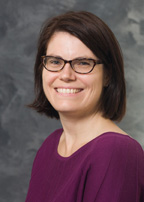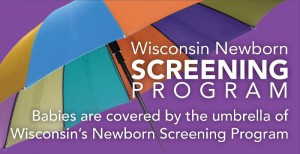
The first time parents hold their newborn baby, the rush of emotions and desire to protect their little one can feel almost overwhelming.
In addition to their parents, these youngest Wisconsinites are also protected by the umbrella of the Wisconsin Newborn Screening Program. September is National Newborn Screening Awareness Month.
Newborn screening includes a test performed on a few drops of blood from a baby’s heel, as well as having their hearing and heart checked.
Between 24 and 48 hours after a baby is born, hospital staff (or a midwife for home births) will prick the baby’s heel and a few drops of blood are put on a special newborn screening collection card. The card is sent to the Wisconsin State Laboratory of Hygiene’s (WSLH) Newborn Screening Laboratory where scientists test the dried blood spots for 44 rare, serious disorders that, if not treated quickly, can lead to severe health problems and sometimes even death.
If a baby tests positive for one of the disorders, the state lab immediately contacts the baby’s healthcare provider. More tests will be done to confirm the screening result.
Some of the disorders screened for include cystic fibrosis, phenylketonuria (PKU), hypothyroidism, sickle cell disease, severe combined immune deficiency (SCID) and galactosemia.

Dr. Mei Baker, Co-Director, Wisconsin Newborn Screening Laboratory
“We screen nearly 65,000 infants a year for these rare, serious disorders and about 135 will have one of the 44 disorders,” says Mei Baker, a UW-Madison pediatrics associate professor and co-director of Wisconsin’s Newborn Screening Laboratory. “For those babies, a few drops of blood from their heel saved their life and gave them a chance for normal growth and development.”
Babies also have their hearing and hearts tested at the hospital or by a midwife after a home birth. More than 100 babies a year are diagnosed with permanent hearing loss and 30 to 40 will have a serious heart defect, lung disease, or infection identified by heart screening.
If a baby’s newborn screening results are normal – and that’s the case for 99.9 percent of babies – the test results will be sent to the baby’s health care provider. Parents should be sure to ask their baby’s doctor for the newborn screening results.
Even though the vast majority of babies have normal newborn screening results, it’s still important to screen all of them.
“Nearly all of the 44 disorders, hearing loss, and critical congenital heart disease are unrecognizable at birth, at least by routine physical examination,” says Patrice Held, a UW-Madison pediatrics assistant professor and co-director of the Newborn Screening Laboratory.

Dr. Patrice Held, Co-Director, Wisconsin Newborn Screening Laboratory
Because of the importance of newborn screening to babies’ health, it’s crucial for hospitals and midwives to send the blood specimens to the WSLH quickly. More than 99% of babies’ blood specimens arrive at the WSLH within 4 days of the heel prick. The WSLH also sends hospitals and midwives a monthly quality report showing how quickly specimens are sent and whether there are any quality problems with the blood specimens.
In Wisconsin, newborn screening testing is mandatory, but parents can opt out for religious reasons or personal conviction. The comprehensive program is administered by the Wisconsin Department of Health Services and the Wisconsin State Laboratory of Hygiene. The program also includes physician consultants, genetic counselors and nutrition professionals from around the state.

For more information:
Wisconsin Newborn Screening Laboratory (WSLH)
Wisconsin Department of Health Services Newborn Screening
Written by: Jan Klawitter, WSLH Public Affairs Manager
